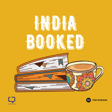
India Booked | Women, Morality and Moral Strength
‘Bhairavi- The Runaway’, written by Shivani aka Gaura Pant, a pioneer of women’s fiction in India, is the story of a woman's life, her resilience, her moral and mental strength, and about the restraints and choices women have in the society.
In this episode of India Booked, the translator of ‘Bhairavi’ and Chitra Mudgal’s ‘Giligadu’, Priyanka Sarkar talks to Ayushi Mona about her experience translating the books, the scope and depth of women’s literature, about bringing alive a concept to an unaware audience and as she says, ‘translating the untranslatable’.
The discussion in this episode spans from the reactions women receive from the society for writing bold books to the inclusion of glossaries in translations to spirituality and sensuality in mythology and the aspect of humanizing the characters in it. Priyanka takes us into the world of ‘Bhairavi’ through significant excerpts from the book, both in Hindi and English, while pulling out comparisons between them and explaining the nuances of translation. Tune in now!
